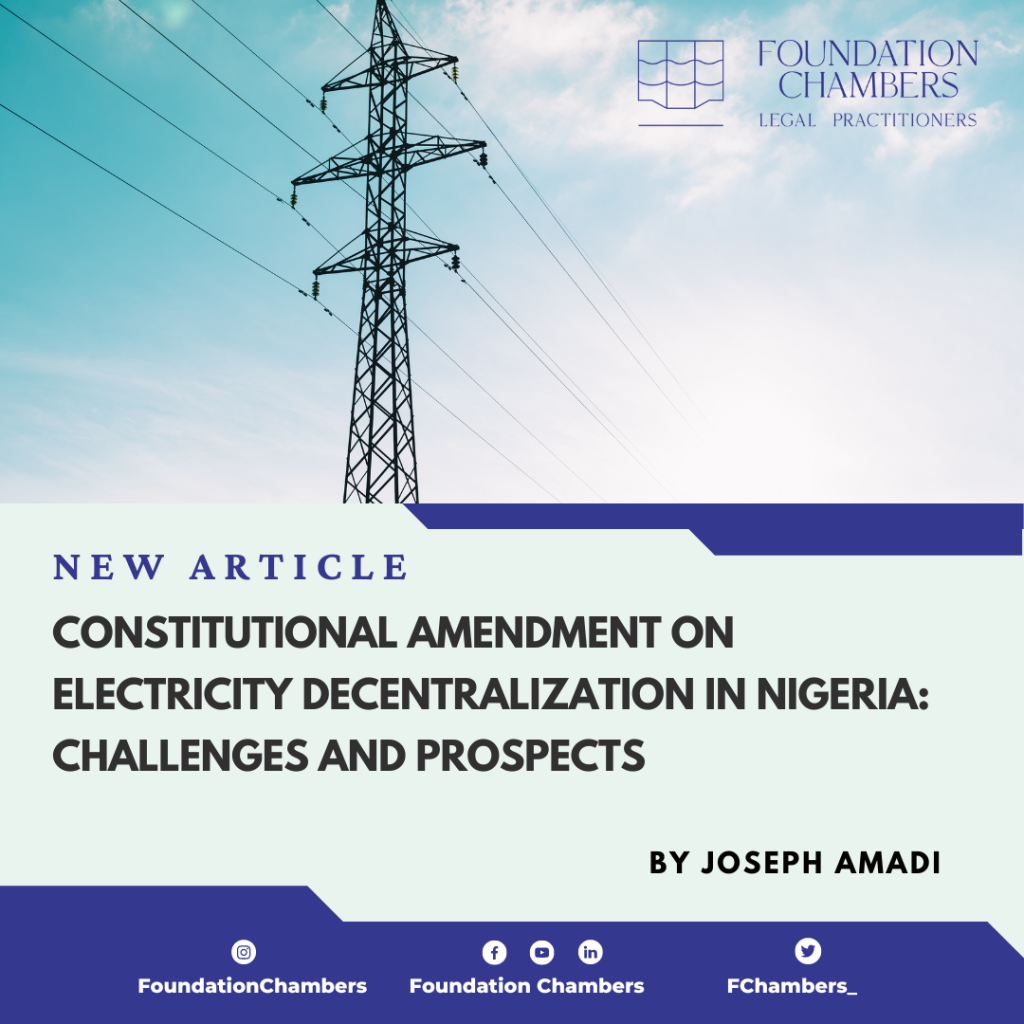Introduction
One of the noteworthy achievements of the 9th National Assembly of the Federal Republic of Nigeria is the transmission of sixteen (16) constitutional amendment Bills to the then President of the Federal Republic of Nigeria, H.E. Muhammadu Buhari, for amendment of various provisions of the Constitution of the Federal Republic of Nigeria, 1999.
The said Bills were assented to at the twilight of his administration and one of the Bills is the Fifth Alteration (No.17), to allow States to generate, transmit and distribute electricity in areas covered by the national grid; and for related matters. This power was prior to this amendment, domiciled in the Federal Government by virtue of the Concurrent Legislative List.[1] States were only permitted to legislate upon generation, transmission and distribution of electricity to areas not covered by a national grid system within the States. This laudable constitutional amendment is also recognized and entrenched in the Electricity Act 2023[2], which was just recently assented to by the incumbent President of the Federal Republic of Nigeria, H.E. Bola Ahmed Tinubu.
It is worthy to note that the Nigerian Electricity Supply Industry (NESI) has long been plagued with many challenges including frequent national grid collapse, resulting in epileptic power supply to homes and businesses across the country. In 2022 alone, the national grid collapsed eight (8) times. This led to blackouts across the country and a surge in the use of unsafe sources of power such as petrol and diesel generators, which are perceived to be less friendly to the environment. Ultimately, the said collapse hampered the growth of the nation’s economy as many businesses have had to shut down due to huge running costs. On the 25th of September 2022, when the national grid collapsed, the power generation on the system crashed from 3,700MW to as low as 38MW.[3] It is therefore an incontrovertible fact that this constitutional amendment is not just a welcomed development, but a step in the right direction.
Prospects
Given the numerous challenges experienced in the NESI prior to the recent constitutional amendment and the passing of the Electricity Act 2023, the opportunities the decentralization of power generation, transmission and distribution offers are limitless. These opportunities include:
- Increased Foreign Direct Investment: Both Foreign Direct Investments (FDI) and Foreign Portfolio Investments (FPI) in existing power companies are projected to rise significantly as States are now in a position to issue licenses and permits to investors with the competence and technical know-how to set up power generating plants, transmission, and distribution networks. In the coming months, it is anticipated that the Houses of Assembly of the various States will swing into action to take advantage of the recent constitutional amendment to put in place a legal framework for generating, transmitting, and distributing electricity in their States as well as the establishment of a supervising agency for the licensing of private investors in the States’ electricity supply industry. It is therefore prudent for potential investors to monitor the emergence of the legal frameworks from the Houses of Assembly and Executive arms of the various States across the country in the near future.
- Improved Power Generation, Transmission and Distribution: This is believed to be the overall goal of the constitutional amendment. The NESI, which is currently plagued with various challenges ranging from infrastructure decay to inadequate financing, will receive a major boost, as all its facets, from generation to distribution will be revamped and optimized for greater output and better service delivery to end users.
- Lower Tariff: The current tariff methodology used in the NESI, as set by the Nigerian Electricity Regulatory Commission (NERC) is the Multi-Year Tariff Order (MYTO) distribution/end-user tariff, which ensures that electricity prices are cost-effective, losses are reduced and very little of such losses are passed on to the customers. In a recent report,[4] electricity tariff is projected to increase by more than 40% from July 2023, due to the price-setting challenges being faced by NERC. This is as a result of the stance of the Federal Government on the removal of petrol subsidy and the floating of the Naira.
With a projection of N88/kilowatt from an average of N64/kilowatt, electricity tariff is set to increase by July 2023. However, with the constitutional amendment taking effect, it can be reasonably projected that market forces will drive prices down in the long haul, as more investors would set up power generating companies in the various States, and the generated power will eventually be distributed to consumers at a lower tariff as supply increases.
- Employment Generation: Job creation is one of the resultant effects of increased investment in any sector. The constitutional amendment will spur investments in power generation, transmission and distribution which will most certainly create thousands of direct and indirect employment opportunities.
- Increased Internally Generated Revenue (IGR) from the Power Sector: State Governments will record a significant increase in tax revenue, as more companies will begin operation in the NESI. Revenue is also expected to be generated from the granting of licenses and permits to investors who intend to enter the electricity supply industry at the State level.
- Rapid Industrialization: Power supply is critical for rapid industrialization and economic growth. The importance of constant power supply to Micro, Small and Medium Enterprises (MSMEs) cannot be overlooked. In 2022, the World Bank’s Practice Manager, West and Central Africa Energy, Ashish Khanna, stated that businesses in Nigeria lose about $29bn yearly because of unreliable electricity.[5] The decentralization of electricity will therefore lead to the creation of mini and microgrid projects which will improve access to electricity by MSMEs, especially in rural and un-served areas within the States.
Challenges
Despite the positives to expect by the said constitutional amendment, some challenges loom in the background. A few of such challenges include:
- Potential Contractual Breaches/Disputes: It is inevitable that contractual breaches and commercial disputes will arise as a result of the recent decentralization of electricity. The Generating Companies (Gencos), Distribution Companies (Discos) and Independent Power Producers (IPPs) who have existing contracts with the Transmission Company of Nigeria (TCN) and Nigerian Bulk Electricity Trading Company (NBET) based on the significantly large market available in the NESI may need to renegotiate some of those contracts to reflect the possibility of a lower market with the creation of electricity supply industries in the various States.
- Double Regulation/Over-regulation: The Houses of Assembly of the various States, will, following the recent constitutional amendment, create legal frameworks for power generation, transmission and distribution within their State, as well as regulating agencies and complementary regulations. This has the potential of leading to double regulation and over-regulation, especially on existing Gencos and Discos, who may be mandated to meet certain requirements or regulatory standards of the States within which they operate.
- Poor Maintenance/Abandonment of Federal Government Assets: With the imminent influx of both States’ and private investments in the electricity sector at the State level, poor maintenance and/or complete abandonment of Federal Government assets and power infrastructure is a foreseeable challenge, given the already existent poor maintenance culture of governments at all levels in Nigeria.
Conclusion
The NESI has for long been faced with various challenges ranging from under-generation to dilapidated transmission infrastructure and frequent grid collapse. According to a recent World Bank report, about 85 million Nigerians do not have access to grid electricity. This represents an estimated 43% percent of the country’s population, making Nigeria the country with the largest energy access deficit in the world.[6] Nigeria currently has a total generation capacity of about 12,522MW, but average operational capacity is just about 3,879MW, of which 7.4% is lost in transmission and up to 27.7% load is rejected at distribution, leaving just about 2,519MW for a country with an electricity demand of over 25,000MW.[7]
The constitutional amendment could therefore not have come at a better time. The need for States to key into power generation, transmission and distribution is indeed critical to make up for the deficit in power generation and supply in the country. It is expected that the respective State Governments will optimize this golden opportunity to make critical investments in the electric power sector of their respective States, to not only attract greater investment to their respective States, but to also spur multi-sector state-wide developments.
References
- Constitution of the Federal Republic of Nigeria 1999 (as amended).
- Electricity Act 2023
- PUNCH Newspaper Column of 5th March 2023. Available at https://punchng.com/national-grid-may-collapse-with-6000mw-power-nycn/#:~:text=Various%20updates%20from%20the%20sector,to%20as%20low%20as%2038MW. Accessed on 25th April 2023.
- Households under pressure as new electricity tariff due July 1 – The Guardian, Monday, June 19, 2023. Available at https://guardian.ng/news/households-under-pressure-as-new-electricity-tariff-due-july-1/ Accessed 19th June, 2023.
- Businesses hit with N96.4tr losses as power failure worsens – The Guardian, 14th March, 2022. Available at https://guardian.ng/news/businesses-hit-with-n96-4tr-losses-as-power-failure-worsens/ Accessed 20th June, 2023.
- Decentralizing Nigeria’s power sector – Business Day, 20th April, 2023. Available at https://businessday.ng/opinion/article/decentralizing-nigerias-power-sector/ Accessed 20th June 2023.
- Challenges and Interventions Needs in the Nigerian Electricity Supply Industry – Centre for the Study of the Economics of Africa, 29th October, 2018. Available at https://cseaafrica.org/challenges-and-interventions-needs-in-the-nigerian-electricity-supply-industry-nesi/ Accessed 18th March, 2023.
[1] Section 4, Second Schedule, Part II, Item 13, Constitution of the Federal Republic of Nigeria 1999 (as amended).
[2] Section 2, Electricity Act 2023
[3] PUNCH Newspaper Column of 5th March 2023. Available at https://punchng.com/national-grid-may-collapse-with-6000mw-power-nycn/#:~:text=Various%20updates%20from%20the%20sector,to%20as%20low%20as%2038MW. Accessed on 25/4/2023.
[4] Households under pressure as new electricity tariff due July 1 – The Guardian, Monday, June 19, 2023. Available at https://guardian.ng/news/households-under-pressure-as-new-electricity-tariff-due-july-1/ Accessed 19th June, 2023.
[5] Businesses hit with N96.4tr losses as power failure worsens – The Guardian, 14th March, 2022. Available at https://guardian.ng/news/businesses-hit-with-n96-4tr-losses-as-power-failure-worsens/ Accessed 20th June 2023.
[6] Decentralizing Nigeria’s power sector – Business Day, 20th April, 2023. Available at https://businessday.ng/opinion/article/decentralizing-nigerias-power-sector/ Accessed 20th June 2023.
[7] Centre for the Study of the Economics of Africa, “Challenges and Interventions Needs in the Nigerian Electricity Supply Industry” – 14th July 2020


